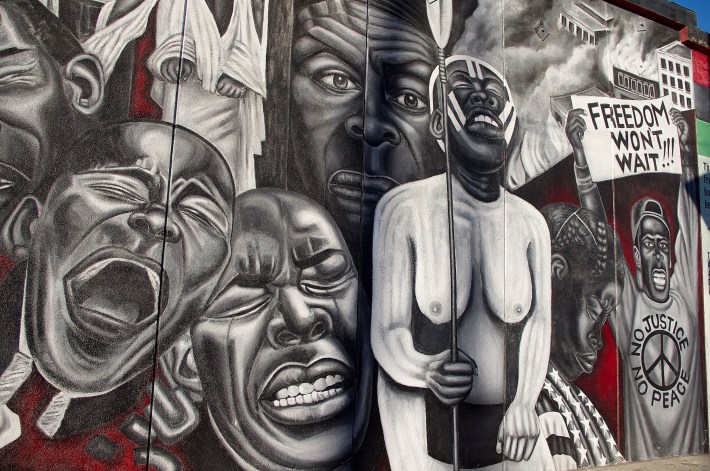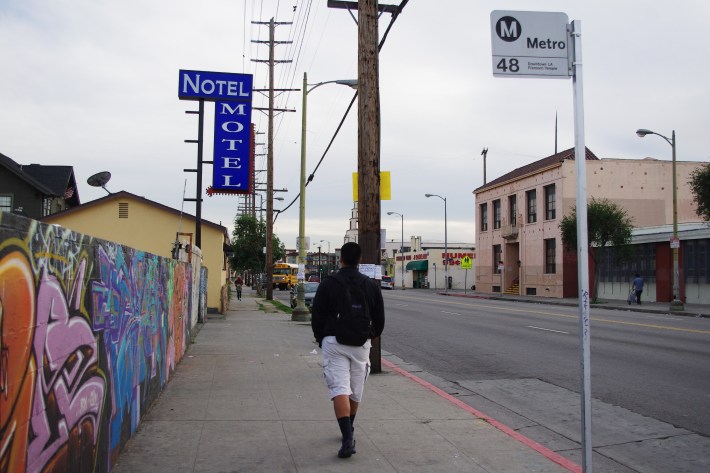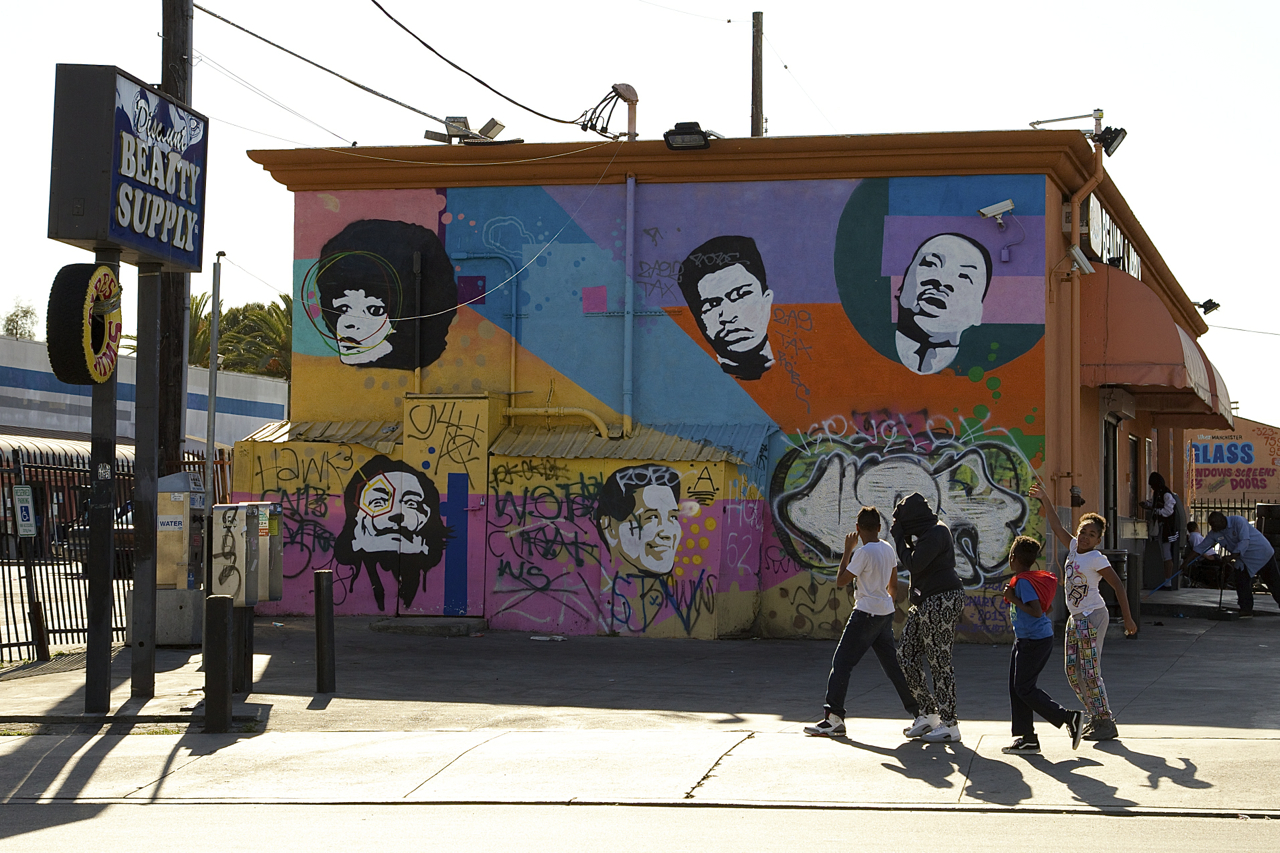"Why y'all got your guns pointed at me when I ain't do nothing?"
Panic, confusion, exhaustion, hurt - it's all right there in his voice. But can the officers hear it? I don't know. I hold my breath and try to make out what the muffled voices are saying.
"If I reach into my pocket to get the knife and throw it, how do I know you aren't going to shoot me?" he asks.
More muffled voices.
They are deciding which direction he should throw the knife in.
I hear him list the other objects in his pockets.
He insists it was just an argument that he and his girl had been having. He says he never held the knife to his own throat and reiterates that he doesn't want to hurt anyone.
This is not exactly true. He has been shouting at his girl for two straight hours, telling her she is a liar and accusing her of trying to kick him to the curb so she can be with her child's father. Of trying to put him out on the streets when she knows he has nowhere else to stay. When she called the police after he had grabbed a butcher knife and held it to his own throat, threatening to hurt himself, he accused her of trying to get him killed. "I ain't finna go to jail!" he had screamed over and over. "I'm gonna die tonight!"
But he doesn't really want to die. He just wants to stop hurting.
I hear him ask the officers if he will be shot again.
"I don't want to go to jail. I don't want no 5150. I don't want to lose my job. I didn't do nothing."
He finally tosses the knife.
As the officers approach, he asks if they are going to cuff him and again insists there is no need because he didn't do anything.
"They just want to make sure you are safe," I interject quietly, alarmed at hearing his voice rising and praying I am right. "You need help and they are there to help you. Not punish you."
An officer asks if he is talking to someone on his earpiece and tells him he's going to have to hang up.
Before the connection cuts, I hear the plea underlying all the panic that pushed him to this point: "Officer, I don't have nowhere else to go."
***

He calls from the police station a few hours later.
He's OK, he says. He's just being processed before being sent to the Exodus Recovery facility at King in Willowbrook.
He hands the phone to someone from the LAPD's mental evaluation unit who tries to tell me that the issue at hand is that the young man in question is not taking his medication.
Except that it's not.
While it is indeed true that said young man has custody of a number of demons, few are of his own making.
Practically everything that has either happened to him or that is "wrong" with him can be traced directly back to the generational trauma segregation, disenfranchisement, mass incarceration, lack of opportunity, and lack of access to health care imposed upon his family and his community.
Which is not to say that everyone in South Central shares his particular experience - they don't.
But it is to say that his experience and the barriers he faces in trying to transcend it are inextricably tied to all that his community - and particularly the African American community - was denied.
When he was badly abused as a child, for example, there was no robust social safety net there to cradle and protect him - residents and institutions alike had been stripped of their resources. Instead, he bounced from place to place via the foster system and was parked in remedial classes in the under-resourced schools where he landed.
Gang membership provided some sense security in an area where the police behaved like an occupying force. It also offered him both a band of surrogate brothers who understood his pain and something to belong to as his own family members died, were incarcerated, or became more deeply mired in addiction. But it also came at a cost - he would be in and out of juvenile jail throughout his teens. By the time he was spit back out into society around age 21, he was technically an adult but had few of the skills necessary to survive as one and no social network he could fall back on for support.
The struggle to manage his mental health issues while rebuilding a life, finding a stable and reasonably well-paying job reachable by transit, and accessing affordable housing have taken their toll over the last couple of years.
When he was first released from jail, he had been set up with part-time housing and mental health services through the North County Regional Center - a nonprofit contracted by the county to provide or coordinate services and supports for individuals with developmental disabilities (including the learning disabilities he has). But the center was located in Lancaster, far from everything he knew and everywhere he wanted or needed to be. After a few years of shuttling back and forth between South Central and Antelope Valley, he had had enough of long train rides. He trained to become a security guard and moved in with his girlfriend in South Central.
Without regular access to services, however, many of the unresolved emotional issues from his childhood resurfaced as his relationship progressed. The tensions were always exacerbated by the fact that he had no one to turn to for guidance and nowhere else to go. His mother's place was out of the question - her addictions and mental health issues made it impossible for him to be there more than an hour or two. Friends and extended family had their own struggles or were in their own unstable living situations and couldn't take him in. Area motels were too costly and shelters, too terrifying. And while a nearby laundromat had been a handy place to doze in an emergency, it was hardly a long-term solution.
Being 5150-ed - detained by the LAPD, given a psychiatric evaluation, and involuntarily held at a medical facility for up to 72 hours - sometimes crossed his mind as an option. But given that he could risk losing his job if he was held over for more than a night, it wasn't a practical solution, either.
The prospect of being kicked out of his girl's home for good was tantamount to losing his tenuous grip on stability.
It triggered extraordinary levels of panic.
Which is why this past Tuesday night was not the first time he'd found himself standing in the middle of the street, holding a knife and telling officers pointing their guns at him that he had nowhere else to go.
But the fact that I was on the phone with him throughout the entire ordeal, in its own way, represented a form of progress. It was the first time he had consciously tried to stop himself from getting so out of control.
When another mentor of his and I had staged a sort of informal intervention in early July, he had acknowledged it was finally time to get help.
And he had tried.
He had asked the Lancaster regional center to transfer his file to the South Central office so he could access services there.
Then, desperate for help and unsure how long that transfer process would take, he had visited a local clinic to ask about seeing a counselor. Too agitated to spend so many hours waiting at the clinic just to be able to set a first appointment, however, he had ended up abandoning ship.
On the verge of being thrown out of the apartment again two weeks later, he had agreed to go back to the clinic if I went with him.
When, on August 9, we finally walked out of the clinic after two and a half hours there, I had stared at the piece of paper the intake worker had given us, crestfallen.
The appointment was for mid-September - a full month away.
As it was, the late-night calls to help mediate disputes had already been coming more frequently. "Can you explain to her why I'm like this? Tell her I'm really trying?" he would plead. "She doesn't understand - I DON'T HAVE NOWHERE ELSE TO GO."
She did understand, actually. She just was exhausted by how much he was asking of her. And although she appreciated his help - he had bought mattresses for her kids and a few other household things for their otherwise sparsely furnished apartment - the relationship wasn't particularly healthy for either of them.
His clothes remained in a garbage bag on top of the folding table in the corner. Things between them seemed poised to unravel at any moment, meaning September might as well have been never.
There was little we could do about the appointment but shrug and agree to keep a dialogue going in the meanwhile in the hopes of averting a major crisis.
He had kept to his word, checking in with me regularly and talking things through. Sometimes several times a day. But it clearly wasn't enough.
He was now getting hauled off to the psych ward for the night and it looked like he might finally be getting the boot from his girl's place for good.
I want to explain all this to the officer from the mental evaluation unit - to scream that the Abilify he's been prescribed for an illness he doesn't appear to have won't give him a stable family or resurrect lost friends and loved ones from the dead. That it won't free his brothers from jail. That it won't help find him an affordable apartment. That it can't make the streets feel safer or make former rival gang members forget who he is. And that it can't undo the neglect and abuse he's endured, teach him the life and interpersonal skills he never acquired, or restore his sense of self-worth.
Instead, I say that he's a good kid who has been through a lot. That he works full time and that he's good at his job. That he needs a more stable housing situation because of the panic and feelings of abandonment the threat of losing it induces. That maybe once his first paycheck comes in this month independence will become a more realistic possibility. That the mental health appointment he has next week has been a long time coming and that he's been doing his best to manage his anger issues in the interim.
"We were just hoping to make it to that September appointment without a major incident," I tell the officer. "But, well... here we are."
***

It's late afternoon and someone has just rolled into the parking lot blasting Ja Rule.
I look out the window to see a mother hen and her fluffy brood of chicks scurrying for cover under a dumpster.
The older gentleman who told us he was unsure of where he was at the moment is still sitting on the stairs, wondering when whatever he is on is finally going to wear off.
"I know it's not ideal," I say. "But you'll be safe here for a couple of nights."
It's not far from where his girl lives (and where his clothes are still stashed), it's only a couple of blocks from where he works, the motel owner is kind, and everyone here seems to be in the same situation that he is - namely, they, too, have nowhere else to go.
I look back at him sprawled across the bed that takes up most of the space in this cramped, dingy room. I don't know which of us is more discouraged.
He had called just before 1 a.m. to say that he was OK when they dropped him off at the psych facility. I had gotten up a few hours later and, by 7 a.m., had already begun reaching out to every possible social service that I could find to ask about emergency or temporary housing. I knew he'd be released later that morning and I wanted to have somewhere I could send him.
Seven hours later, I was still on the phone and all I had to show for it were a handful of dead ends.
At age 25, he was a year too old to access to services for youth.
The Lancaster regional center had never transferred his files to South Central, meaning the South Central office couldn't offer him any assistance right away. And his case manager in Lancaster wasn't answering my calls.
After an hour on hold with 311, I had been given a reference for a shelter on Skid Row (but which also has programs elsewhere around the city) that I never heard back from.
The few longer-term affordable housing options I had found near his work had wait lists. And most of the myriad other leads I had followed up on eventually landed me in voice mailboxes.
The AirBnBs in the area were relatively cheap, but were booked through the end of the month.
"I honestly don't know how someone in trouble would track any of these things down on their own," I heard myself say to more than one person who was kind enough to try to help me.
By mid-afternoon, I had caved and called a motel near his girl's place just so I could be guaranteed he had a safe place to be for the night.
But at $85 a night, I tell him when we meet up around 5:30, there is a limit to how long I can afford to foot that bill.
He nods.
I look out the window again, wondering how any of the folks here longer-term are able to afford that. With so many resources having been injected into the infrastructure aiming to support those experiencing homelessness over the last couple of years, it's hard to understand how this motel came to be the best option.
"Should I call [the therapist he had while at the regional center in Lancaster], or do you have to go?" he asks.
It's 6:30. I don't know if the therapist will answer.
The therapist is surprised to get the call but reassures us that if we can raise the necessary hell to get the records transferred to the South Central regional center, staff there will be able to assist with housing and other services.
I hang up feeling almost optimistic for the first time in two months.
"If we can just get you through this weekend, maybe things will work out OK," I venture.
He nods. He looks drained. He hasn't really eaten all day.
There's no one left to call tonight - we've done all we can.
"Let's get you fed," I say. "We'll start again tomorrow."






